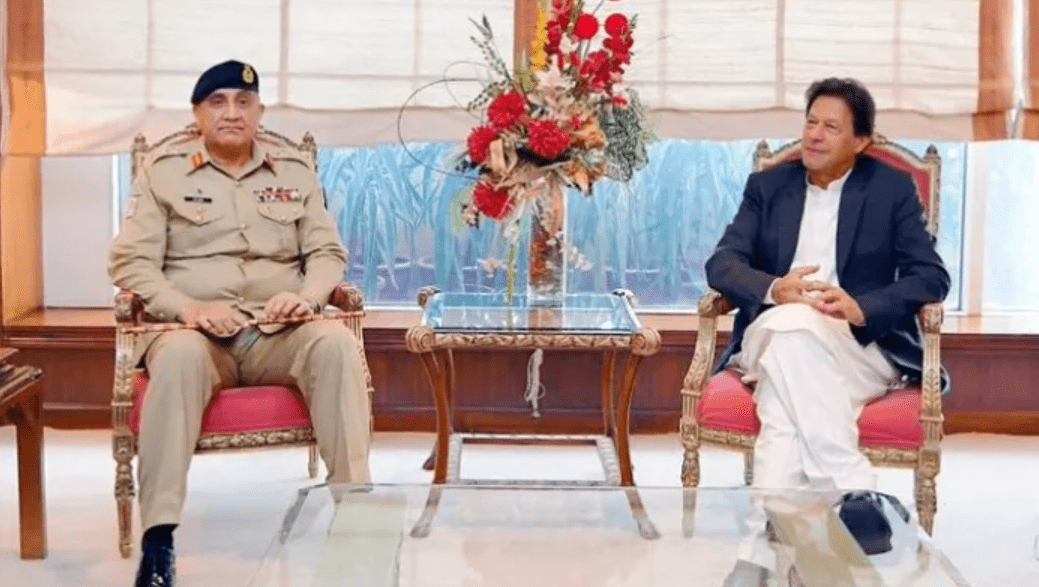
Imran Khan, former Prime Pinister and perhaps the best-known Pakistani outside its shores, also symbolizes the country that the democratic world has fearfully watched, yet wooed — one that holds the gun to its own head and demands attention.
For decades, that gun was a nuclear arsenal. The export of terrorism added to that fear factor. And now, it is the threat of an internal implosion that endangers the welfare of its 220 million people. Its slide from a ‘failing’ state to ‘failed’ is nearing the end of its journey, hurtling towards political, economic and social chaos.
Its effete politicians and the all-powerful and gun-crazy army have ruled Pakistan for 75 years, but Imran Khan’s contribution, although less than four years, has been immense.
Always playing the king-maker, the army-bureaucracy ‘establishment’ is now wondering where it went wrong: in putting him in power as its proxy, or letting him be voted out through a no-confidence vote in the National Assembly. For, the year since that happened has seen unprecedented polarization of Pakistan’s polity.
After the bureaucracy and the judiciary, now the army itself is divided, strangely, on whether to keep Khan out of power or give him a second chance. Through its hierarchy, the military has never been so divided over an individual, curiously, its own political creation. Because Khan has turned virulently anti- army, alleging daily that it wants him killed.
Khan blames his ouster on a United States-led ‘conspiracy’ after obsessing that President Joe Biden did not even telephone him. He hailed the Taliban pushing out America/Nato from neighbouring Afghanistan as “freedom from slavery”. Now, he alleges that the ‘conspiracy’ extends to his being killed.
The constituency of this Pied Piper of Pakistan, besides the middle classes, includes the Islamists (former dictator Pervez Musharraf called him ‘Taleban Khan’), susceptible to anti-West rhetoric.
Yet, ironically, his display on the Time magazine cover page has enthused his followers and admirers. The latter includes Britain where he spent his younger years playing international cricket, moving among its high society and for some years, marrying an heiress.
Nobody has an answer to Imran’s daily rant about being killed. His plastered
foot after a failed assassination attempt for which he blames everyone but his Islamist allies is always on the show to the television cameras.
Extremely media-savvy, this has been his handy weapon in his relentless pursuit of power. His fight to avoid a law court appearance caused riots. And when he appears, he sometimes hides his face in a bulletproof box and sometimes in a leather jacket. Paranoia has become the political weapon that makes the people at home woo him and causes fear in the world outside. He is like a suicide bomber demanding that everyone should succumb to his demands.
Not for the first time though, Khan has polarized society while posing as its ‘messiah’. Known for reneging, “Mr U-Turn” has refused to talk to the ‘thieves’ in the government. He has deepened, and taken full advantage of, the schism that has divided every state institution, and definitely, much of it has wilted under his bluff and bluster. That includes the judiciary which has a record of validating military incursions into politics and political excesses. And now, it’s the army. Its new Chief, General Asim Muneer, is under attack for nepotism from Khan’s supporters, and for inaction from the critics.
This brinkmanship plays out amidst Pakistan’s worst hour when the economy is under dire stress and could default if the much-delayed International Monetary Fund (IMF) bailout does not come. Inflation has made essential commodities dear during the holy Ramadan, causing street riots and deaths. Repeated calls for all stakeholders to talk have failed so far.
Dr. Shuja Nawaz, Distinguished Fellow in the South Asia Center at the Atlantic Council, writes on East Asia Forum (April 6, 2023):
“Even if the government (of Prime Minister Shahbaz Sharif) manages to keep the military on its side through March, April may well become the cruellest month for Pakistan if the IMF deal falls through and a government debt default occurs. In that case, the military may be tempted to take over or craft a fragile arrangement with Khan as a frontman yet again. It is a Hobson’s choice for both the military and the people of Pakistan as economic danger rises.”
The Time magazine says: “From the U.S. perspective, he may be far from the
ideal choice to helm an impoverished, insurgency-racked Islamic state.”
Since Khan is the TINA (there is no alternative) factor, a worried world must watch how Khan performs this summer. (Ends)






